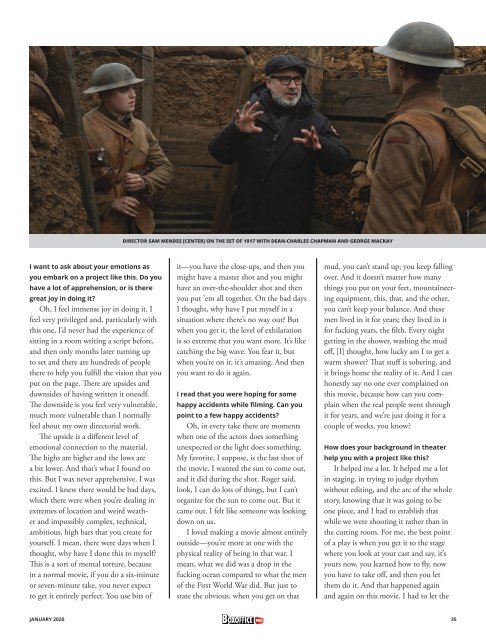Boxoffice Pro - January 2020
The Official Publication of the National Association of Theatre Owners
The Official Publication of the National Association of Theatre Owners
- No tags were found...
You also want an ePaper? Increase the reach of your titles
YUMPU automatically turns print PDFs into web optimized ePapers that Google loves.
DIRECTOR SAM MENDES [CENTER] ON THE SET OF 1917 WITH DEAN-CHARLES CHAPMAN AND GEORGE MACKAY<br />
I want to ask about your emotions as<br />
you embark on a project like this. Do you<br />
have a lot of apprehension, or is there<br />
great joy in doing it?<br />
Oh, I feel immense joy in doing it. I<br />
feel very privileged and, particularly with<br />
this one, I’d never had the experience of<br />
sitting in a room writing a script before,<br />
and then only months later turning up<br />
to set and there are hundreds of people<br />
there to help you fulfill the vision that you<br />
put on the page. There are upsides and<br />
downsides of having written it oneself.<br />
The downside is you feel very vulnerable,<br />
much more vulnerable than I normally<br />
feel about my own directorial work.<br />
The upside is a different level of<br />
emotional connection to the material.<br />
The highs are higher and the lows are<br />
a bit lower. And that’s what I found on<br />
this. But I was never apprehensive. I was<br />
excited. I knew there would be bad days,<br />
which there were when you’re dealing in<br />
extremes of location and weird weather<br />
and impossibly complex, technical,<br />
ambitious, high bars that you create for<br />
yourself. I mean, there were days when I<br />
thought, why have I done this to myself?<br />
This is a sort of mental torture, because<br />
in a normal movie, if you do a six-minute<br />
or seven-minute take, you never expect<br />
to get it entirely perfect. You use bits of<br />
it—you have the close-ups, and then you<br />
might have a master shot and you might<br />
have an over-the-shoulder shot and then<br />
you put ’em all together. On the bad days<br />
I thought, why have I put myself in a<br />
situation where there’s no way out? But<br />
when you get it, the level of exhilaration<br />
is so extreme that you want more. It’s like<br />
catching the big wave. You fear it, but<br />
when you’re on it, it’s amazing. And then<br />
you want to do it again.<br />
I read that you were hoping for some<br />
happy accidents while filming. Can you<br />
point to a few happy accidents?<br />
Oh, in every take there are moments<br />
when one of the actors does something<br />
unexpected or the light does something.<br />
My favorite, I suppose, is the last shot of<br />
the movie. I wanted the sun to come out,<br />
and it did during the shot. Roger said,<br />
look, I can do lots of things, but I can’t<br />
organize for the sun to come out. But it<br />
came out. I felt like someone was looking<br />
down on us.<br />
I loved making a movie almost entirely<br />
outside—you’re more at one with the<br />
physical reality of being in that war. I<br />
mean, what we did was a drop in the<br />
fucking ocean compared to what the men<br />
of the First World War did. But just to<br />
state the obvious, when you get on that<br />
mud, you can’t stand up; you keep falling<br />
over. And it doesn’t matter how many<br />
things you put on your feet, mountaineering<br />
equipment, this, that, and the other,<br />
you can’t keep your balance. And these<br />
men lived in it for years; they lived in it<br />
for fucking years, the filth. Every night<br />
getting in the shower, washing the mud<br />
off, [I] thought, how lucky am I to get a<br />
warm shower? That stuff is sobering, and<br />
it brings home the reality of it. And I can<br />
honestly say no one ever complained on<br />
this movie, because how can you complain<br />
when the real people went through<br />
it for years, and we’re just doing it for a<br />
couple of weeks, you know?<br />
How does your background in theater<br />
help you with a project like this?<br />
It helped me a lot. It helped me a lot<br />
in staging, in trying to judge rhythm<br />
without editing, and the arc of the whole<br />
story, knowing that it was going to be<br />
one piece, and I had to establish that<br />
while we were shooting it rather than in<br />
the cutting room. For me, the best point<br />
of a play is when you get it to the stage<br />
where you look at your cast and say, it’s<br />
yours now, you learned how to fly, now<br />
you have to take off, and then you let<br />
them do it. And that happened again<br />
and again on this movie. I had to let the<br />
JANUARY <strong>2020</strong><br />
35<br />
0120_1917.indd 35<br />
12/19/19 2:26 PM

















